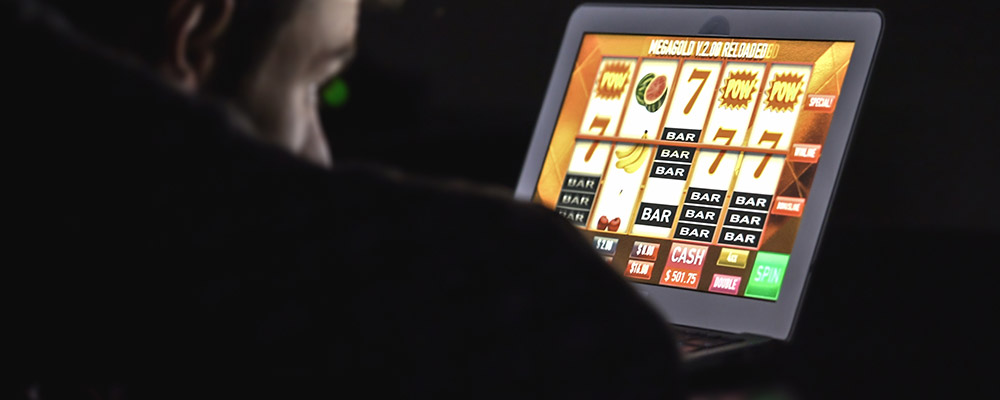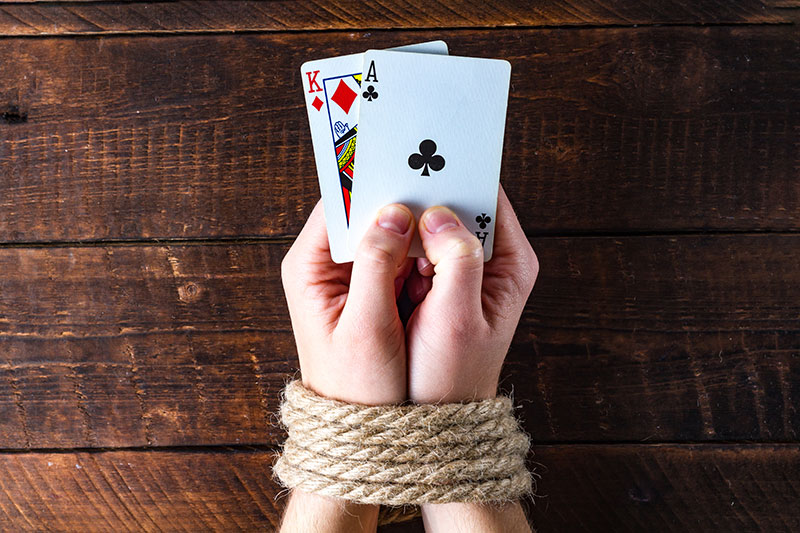Gambling Addiction Treatment & Rehab
Having a gambling disorder is not easy to admit to yourself or your loved ones, it may already be apparent to those around you if the disorder has progressed to a point where you have lost everything, but you may still be in denial.
‘According to a March 2021 survey, the largest percentage of problem gamblers in the United Kingdom were individuals aged 35 to 44. In comparison, no respondents aged 65 years and older stated that they were problem gamblers.’ (• Problem gambling rates UK 2021)
Taking time to understand and recognise the causes, triggers and signs of this disorder, you will see that despite the isolation you feel, you are not alone in this fight, there is hope and help just a phone call away.
Understanding Gambling Addiction
A gambling disorder is about more than just winning, it’s about taking a risk, risk-taking is an intrinsic part of human nature and when used to advance your life, it leads to innovation, entrepreneurship and enhanced creativity. Unfortunately, it can also lead to an increased desire to take harmful risks.
As with substance use disorders, engaging in a thrilling activity that has both the potential for risk and a potential reward, your reward pathways in your brain release large levels of dopamine ( Dopamine: What It Is & What It Does), constantly trying to maintain these levels of dopamine may have led you to risk everything.
During the pandemic and the subsequent lockdowns, there has been a large increase in gambling disorders (The pandemic has triggered a British online gambling crisis) by not only pushing gambling into the online sphere, but lockdowns also meant that people suffering from gambling addiction, those at risk of developing one, and those in recovery were more vulnerable.
If you would like to learn more about residential rehab or would like to speak to an expert regarding the different treatment centres here in the UK, please give us a call.

Recognising the Signs of Gambling Abuse
Although gambling is a behavioural disorder, the DSM-5 (Problem Gambling in the UK: An overview and update.) provides a classification for diagnosis of Gambling Disorder if you have exhibited the following four (or more) signs in the preceding 12 months:
- You need to gamble with increasing amounts of money to achieve the desired excitement
- You are restless or irritable when attempting to cut down or stop gambling
- You have made repeated unsuccessful efforts to control, cut back, or stop gambling
- You often gamble when feeling distressed, helpless, guilty, anxious or depressed
- You ‘chase your losses’ even after losing everything
- You lie to conceal the extent of your involvement with gambling
You are often preoccupied with gambling:
- have persistent thoughts of reliving past gambling experiences
- handicapping or planning the next venture
- thinking of ways to get money with which to gamble
You have jeopardized or lost the following because of gambling:
- A significant relationship
- Job
- Educational or career opportunity
- You are forced to rely on others to provide money to relieve desperate financial situations caused by gambling.
Why Gambling Addiction Treatment is Important
The pre-occupation you have with gambling can supersede other areas of your life putting important things like relationships, employment, financial stability, sobriety (in the case of a dual addiction) as well as your mental health at risk.
The changes to your dopamine levels and the effects on the pleasure centres of your brain can increase the severity of any other mental health issues you may have.
Receiving the treatment you need in a safe and understanding facility will help you to address the causes and triggers that drive your Gambling disorder.
Don’t be afraid to admit you have a problem
If you are ready to end your relationship with gambling, seeking help is an important step. Society has been conditioned to stigmatise gambling addiction thereby making a person, such as yourself feel that they are not worthy of recovery, we want you to know that you are worthy of living life to its fullest without gambling.
Your specific situation will need to be assessed to understand the level, frequency and intensity of your gambling addictive behaviour. Depending on your responses, a residential rehab programme or outpatient treatment will be recommended.

How does Residential Rehab Work for Gambling Disorder?
A residential rehabilitation facility offers you an opportunity to focus on your recovery in a safe and supportive environment, away from temptation. A private facility will ensure your admission is handled as urgent so that you can begin treatment quickly.
With a gambling treatment programme, there is no need for a detox to be completed and you will begin treatment as soon as you arrive at the facility.
The Benefits of a Residential Rehab
- Fast admission
- A flexible, adjustable treatment plan
- Confidentiality and a team of support you can trust
- Multiple treatment methods taking place on one site
- Access to continual support from a range of professional therapists, time to build trust
- Additional therapies offered – Art, Exercise etc
- Visiting/phone call times from family
- Aftercare programmes to support your recovery beyond your stay
Assessment
As with any mental-health condition, accurate diagnosis of gambling addiction requires a complete physical and psychological evaluation, this may include
- A mental-status examination
- laboratory tests to rule out other possible causes of the symptoms that are being observed.
- Substance use disorder check (often gambling and SUD work hand in hand)
The assessment you undergo will also explore the:
- history of your gambling
- nature of the gambling
- gambling frequency
- any patterns
- any related behaviour
- any other help you have had with this problem in the past
Rehabilitative Therapy
Your treatment for compulsive gambling may use more than one approach, including:
- Medication to help ease and treat and co-existing mental health disorders to help curb your impulse control
- Financial counselling to address your existing financial burden and help you to better handle budgets etc
- Support groups help with understanding your addiction and reducing the isolation you may have been feeling
- 12-step programs
- Therapy – in both group and individual settings to promote skills training and help you learn how to cope with the urges, and impulse control issues gambling feeds on.
- self-help techniques
- Cognitive Behavioural Therapy – CBT is a talking therapy that works on the concept that your thoughts, feelings, physical sensations, and actions are connected and that the vicious cycle addiction has trapped you in is through negative thoughts and feelings. Focus is placed on your current state of mind and the problems you are experiencing rather than on the repair of past problems, therapy offers up practical and achievable ways to improve your mental state every day.
- Dialectical Behaviour Therapy (DBT) – Though a form of CBT, the main difference is DBT promotes change by improving emotional stability through experience and behavioural validation. Behaviour modification by challenging faulty or negative thought patterns and belief systems.
Aftercare & Family Support
Although pathological gambling may resolve with rehab, the devastating effects it has had on your financial, family, legal, and mental health status may tempt you to relapse once you return home.
A private rehabilitation facility offers continued aftercare services, family support during and after treatment as well as referrals to private therapists and support groups in your area.
There are also private counselling services that can be done in an outpatient capacity, having ongoing therapy for months or even years after you are discharged will keep you motivated, accountable and leave you with coping skills for your everyday life
The Benefits of Private Counselling
- Dual diagnosis treatment – Depression, ADHD, PTSD
- One on One treatment with the addition in certain circumstances for Group therapy
- Regular meetings with a trained professional
- Coping skills
Secondary Addiction Treatment
Once your initial treatment (generally a 28-day inpatient programme) has been completed, the need for ongoing support for you and your family is available to assist with long-term recovery
This is where a Secondary Addiction Care Service can assist you with:
- Reintegration back into your daily life
- Relapse prevention
- Reestablishing a support network within your community and family
- Continuation of therapy
- Rebuilding your daily life skills
Outpatient Services
Depending on the severity of your compulsive gambling, you may have an option to undergo your treatment programme as an outpatient that receives weekly therapy sessions, attend support groups in your area as well as access to online assistance if required.
Unfortunately trying to overcome addiction at home takes a lot of discipline and you will require a strong support network that includes family and friends. We recommend discussing the options of outpatient vs residential rehab with your loved ones before choosing.
Choosing a treatment centre
Whilst there are many facilities, both public and private that offer addiction treatment, only a few choice facilities can cater to gambling addiction especially when there may be co-morbidities such as a substance use disorder or mental health issue (bi-polar is a common disorder amongst gamblers – https://www.ncbi.nlm.nih.gov/pmc/articles/PMC4589664/)
Factors to consider:
- Location
- CQC rating – All residential treatment centres in the UK are regulated by the Care Quality Commission (What we do | Care Quality Commission), the independent regulator of health and social care in England.
- Is the treatment team credible, certified and experienced in dealing with Methadone addiction?
- 12 Step Model -A spiritual abstinence-based programme pioneered by Alcoholics Anonymous (AA) where the belief is that addiction is a disease. The programme focuses on your motivation to change your addictive behaviours within the treatment and recovery process.
- Non 12 Step Model – These programmes focus on addiction’s multifaceted issue and offer a treatment programme that includes both physical and psychological therapy.
-
Does the centre offer a treatment program that you like? different treatment centres utilise different therapeutic models:
Our team is available to assist you in finding a facility that suits you best.

Paying for Treatment
Private rehab facilities are generally paid for by the client, some offer a payment plan where the final payment is made on discharge.
In some cases, clients have received funding from benefactors, charity groups or their families.
Before Attending Rehab
A residential rehabilitation in a private facility will generally last 28 days (or more if required) and there is a fixed cost that would be non-refundable if you chose not to continue. We recommend that you are committed to the treatment you are going to receive before signing up.
What to bring to the treatment centre
Treatment for a gambling disorder may involve a variety of therapies including exercise, art, music as well as talk therapies, packing your bag lightly and practically with comfortable season-appropriate clothing will help you stay focused.
Some facilities allow cellphones, laptops and home comforts as well. The admissions team will provide you with a comprehensive list.
Talk to the treatment centre if your circumstances have changed
If your circumstances have changed, please let the admissions team know, this could be a change in your support structure at home, living facilities or inclusion of medication.
GamCare Home – GamCare – The leading provider of support for anyone affected by problem gambling in Great Britain – National Gambling Helpline (0808 8020 133)
National Centre for Behavioural Addictions National Centre for Behavioural Addictions
Unfortunately, there are limitations to the treatment you receive in a free service due to a high percentage of patients to physicians.
- More temptation to relapse
- You don’t get a break from the stressors that initiated your need for meth
- You may have little to no support between the predefined treatment schedule you have
- Treatment is less effective in the case of severe gambling disorder
- Little chance of forming a relationship with your therapist as you could end up with a different therapist each visit
Rather talk to your loved one in a non-judgemental, supportive way, keep an open mind. Try to encourage them to seek help and to practise good habits like:
- Get regular exercise.
- Eat a balanced diet.
- Find satisfying hobbies.
- Learn meditation.
Your compassion, advice and patient support can boost your loved one’s chances of a successful recovery
